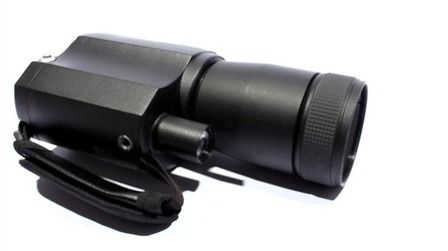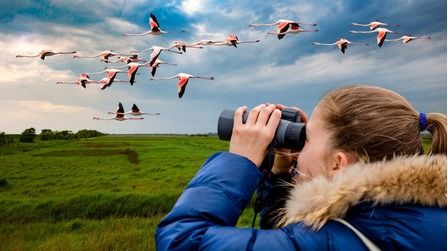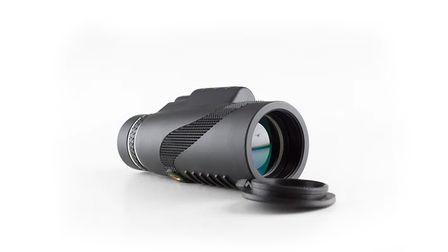Nothing’s more frustrating than setting up a scope, only be met with dark colors and blurry images. When having a day out for birdwatching, what you need the most is a good scope. Let's check our top picks for thebest spotting scopes for birding below.
Here are the best spotting scopes for birding (Jul 2025 Update):
- Best Overall: Bushnell Trophy Xtreme Spotting Scope
- Runner-Up: Celestron Ultima 80 20 Straight Spotting Scope
- Highest Magnification: SVBONY SV17 Spotting Scope
- Best Overall: CREATIVE XP HD Spotting Scope
- Runner-Up: Vortex Optics Diamondback Spotting Scopes
- Best Entry-Level Scope: FEEMIC Upgrade 20-60x60 Waterproof Spotting Scope
| Top 6 Best Spotting Scopes For Birding | ||
|---|---|---|
Best Overall | Bushnell Trophy Xtreme Spotting Scope | Read Our Review |
Runner-Up | Celestron Ultima 80 20 Straight Spotting Scope | Read Our Review |
Highest Magnification | SVBONY SV17 Spotting Scope | Read Our Review |
Best Overall | CREATIVE XP HD Spotting Scope | Read Our Review |
Runner-Up | Vortex Optics Diamondback Spotting Scopes | Read Our Review |
Best Entry-Level Scope | FEEMIC Upgrade 20-60x60 Waterproof Spotting Scope | Read Our Review |
Best Overall: Bushnell Trophy Xtreme Spotting Scope

- Very compact and lightweight that can you can easily carry it around with ease
- Fully multi-coated objective lens to handle perfectly all weather and lighting conditions, giving only full-size brightness and crystal clarity
- Equipped with a hand-free tripod, a car window, and other ultra-convenient stuff to support the best for your birdwatching experience
- Adjustment isn’t smooth and fine a lot
- Not suitable for people who wear glasses as the eye relief is too close
Bushnell has never stopped amazing customers with its innovation. And came out with a premium fully multi-coated optics, the Trophy Xtreme Spotting Scope with its extremely great visual command of dusk-till-dawn conditions.
While packing a tight little bundle of crystal clarity and full-size brightness, it is completely waterproof thanks to the shock-absorbent rubber armored construction.
Thanks to the powerful magnification, you can see targets at 1000 yards.
Though sturdy, the scope itself is pretty lightweight and compact (fit nicely in a gun bag). It also comes in a hand-free tripod to allow longer-range birdwatching and especially, a car window mount for extra convenience.
| Bushnell Trophy Xtreme Spotting Scope Specifications | |
|---|---|
Magnification | 12 to 36x |
Field of View (degrees) | 1.24 – 2.67 |
Field of View (feet @ 1000yds) | 65-140 |
Prism Material | Porro |
Close Focus Distance (feet) | 12 |
Eye Relief (mm) | 14 |
Highlight Features | Porro-prism design; Premium fully multi-coated optics; Magnification: 12 to 36x; Field-of-view is 140-65ft/1000yds |
At the price range of under $250, the Bushnell Trophy Xtreme Spotting Scope is a decent option for bird watchers.
Runner-Up: Celestron Ultima 80 20 Straight Spotting Scope

- Allow you to see birds from 1000 yards and can identify details very well
- Site tube for quicker targeting a moving bird
- Not suitable for birdwatching if hiking because of its uncomfortable sizes
The Celestron Ultima 80 20 is a great bigger brother (literally!) to the Bushnell Trophy.
Let’s address the elephant in the room, this features a terrific objective lens with much bigger diameter and more powerful magnification – 80mm plus 20x to 60x zoom eyepiece. It is apparently designed to watch birds from a farther distance.
In comparison, it would be better than the Bushnell if you want to get the best experience of birdwatching in wildlife.
We also appreciate the built-in sight tube. It wonderfully overcomes the most common problem of huge magnification scopes – slow targeting, meaning that with a moving target, you can easily and quickly keep track of it.
| Celestron Ultima 80 20 Straight Spotting Scope Specifications | |
|---|---|
Magnification | 20-60x |
Field of View (degrees) | 2.0°-1.0° |
Field of View (feet @ 1000yds) | 105-53 |
Prism Material | BaK4 |
Close Focus Distance (feet) | 26.2 |
Eye Relief (mm) | 18 |
Highlight Features | 80mm Refractor Spotting Scope; 20-60x zoom eyepiece; Sight tube for quick targeting; FOV 105-53; eye relief 18 |
If you are going to watch birds at fixed spots, the Celestron Ultima 80 20 spotting scope is our highest recommendation.
Highest Magnification: SVBONY SV17 Spotting Scope

- Deliver 25x to 75x
- Not good at low-light conditions
The last straight spotting scope that we’d like to introduce to you is from SVBONY.
Might this brand name be a little new to you (which is also the reason why it’s knocked down to the 3rd position of ranking) but its performance will leave you in shock.
While featuring straight eyepiece for easier birdwatching experience from a high position, it gives you up to 180 degrees to observe everything more comfortably. Also, the magnification is leveraged to 25-75x power and the field of view is 64-43ft/1000 yds., which is unbeatable.
The given image is so crisp that you can even count birds’ feathers from a farther distance.
We particularly like the tripod as it’s very sturdy and ultra-convenient. You’ve got 4 adjustment options, an adjustable tripod leg range within 17 to 54 inches, and an anti-skid plate. With it, you can set up on different terrains and easily point the scope at your desired object.
| SVBONY SV17 Spotting Scope Specifications | |
|---|---|
Magnification | 25-75x |
Field of View (degrees) | 1.22 – 0.82 |
Field of View (feet @ 1000yds) | 64-43ft |
Prism Material | BAK4 |
Close Focus Distance (feet) | 26.2 |
Eye Relief (mm) | 16-14mm |
Highlight Features | runs from 25x to 75x power 180 Degree straight eyepiece; Field-of-view is 64-43 ft/1000 yds |
Featuring super-high magnification, the SVBONY SV17 Spotting Scope stands out with its superior clarity and great pictures to let you observe birds from a farther distance.
Best Overall: CREATIVE XP HD Spotting Scope

- Do the best of both worlds – delivering brighter and clearer HD imaging at higher zoom without chromatic aberrations
- Larger eye relief so you won’t bump the scope with your glasses
- The ultra-smooth focus with accuracy to deliver more detailed vibrant image
- Heavy-duty but lightweight to not strain down your backpack or travel bag
- Bulkier due to the larger size
- The thumbscrew is a bit flimsy
CreativeXP is a very promising brand where you can rest the heart to buy a top-notch spotting scope for birding. The GlassHawk 20-60x80mm is created in New York, which ensures the quality, at least in our standards.
Making it outstanding from other high-end scopes is the brighter and clearer HD imaging, even at high zoom – like 60x magnification power – with a guarantee of no chromatic aberrations. In fact, you can follow a flapping bird from miles away or see bullet holes from 300 yards with ease.
Two extra big bonuses are the adjustable larger eye relief to support people who wear glasses and the ultra-smooth focus with accuracy for a more detailed vibrant image.
While being so functional, CREATIVEXP doesn’t close its eyes to the product’s quality. Some classic examples are its scratch-resistant, fully multi-coated lenses and the rugged construction.
| CREATIVE XP HD Spotting Scope Specifications | |
|---|---|
Magnification | 20-60x |
Field of View (degrees) | 2.17 – 1.7 |
Field of View (feet @ 1000yds) | 114 - 90 |
Prism Material | BAK 4 |
Close Focus Distance (feet) | |
Eye Relief (mm) | 17-12mm |
Highlight Features | 20-60x80mm; Eye Relief 17-12mm & a wide circular exit pupil of 4-1.3mm |
Heavy-duty but lightweight, CREATIVE XP HD Spotting Scope is a dream come true.
Runner-Up: Vortex Optics Diamondback Spotting Scopes

- Equipped with all classic features of a heavy-duty spotting scope but shrunk down to a smaller, more compact size for easier handling.
- Have a built-in sunshade and XR fully multi-coatings for ultra-crisp, colorful images
- Twist-and-lock collar to easily move the scope for different positions
- Expensive
- The site relief is a bit small
The Diamondback is an incomparable angled spotting scope at the Vortex’s lowest price point (compared to the Razor HD and the Viper HD).
The best way to describe this unit is, it packs all heavy-duty features of a big spotting scope in a really smaller package, weighing less than 34 ounces. The way it remains crisp, vivid images are critical for a good birdwatching scope.
That’s a big thank you to the built-in sunshade and XR fully multi-coatings.
In terms of convenience features, we appreciate the added powerful zoom eyepiece, focus wheel, and twist-and-lock collar. For those who want to move the scope for different glassing directions, this is the best go-to.
| Vortex Optics Diamondback Spotting Scopes Specifications | |
|---|---|
Magnification | 20-60x |
Field of View (degrees) | 2.2 - 1 |
Field of View (feet @ 1000yds) | 114 - 51 |
Prism Material | Multi-layer |
Close Focus Distance (feet) | 20 |
Eye Relief (mm) | 14 - 17 |
Highlight Features | XR fully multi-coated lenses combined with a sunshade; Close Focus: 20 feet; field-of-view 114-51m/1000m |
The Vortex Diamondback is a good choice for those bird watchers who want to own a compact spotting scope but built as a full-sized model.
Best Entry-Level Scope: FEEMIC Upgrade 20-60x60 Waterproof Spotting Scope

- Compared to other counterparts at the same price point, it offers higher magnification and larger eyepiece
- Equipped with anti-shake features and shock-absorbent rubber armor to give the highest HD images
- Deliver 2-speed focus wheels to help you capture quickly more precious moments
- The tripod is a bit cheap
The FEEMIC Upgrade 20-60x60 Waterproof Spotting Scope is quite clearly positioned in the budget category but that doesn’t imply a low-quality product.
Out of reliable customer service, our testers are strongly impressed by its high magnification and large eyepiece compared to other counterparts at this price point. As its name defines, this is an upgraded version, highlighting 20x to 60x power with the HD 24mm eyepiece.
The best thing is its double focus wheels with two speed options –Slow and Fast.
One will slowly zoom on the target and deliver more detailed imaging while the other quickly locks it, respectively. This additional option helps you quickly capture more precious moments of nature – the thing that many bird watchers always thirst for.
While giving sharp, clear images, the optical Anti-Shake with shock-absorbent rubber armor delivers maximum stability and protection. For the price, what else to ask?
| FEEMIC Upgrade 20-60x60 Waterproof Spotting Scope Specifications | |
|---|---|
Magnification | 20-60x |
Field of View (degrees) | 2.68 – 1.34 |
Field of View (feet @ 1000yds) | 141 – 70.5 |
Prism Material | BAK4 |
Close Focus Distance (feet) | High-quality Porro BAK4 |
Eye Relief (mm) | - |
Highlight Features | Upgrade HD 24mm big eyepiece; magnification from 20x to 60x; 4.71 pounds |
We all want to pick the best, even at a tight budget. And the FEEMIC Upgrade 20-60x60 Waterproof Spotting Scope is our highest suggestion for any budget-minded people.
How To Choose The Best Spotting Scopes For Birding?
Angle Body
- There are two main types of spotting scopes – the straight body and the angled body.
- This feature is just a matter of preference for bird watchers as each type will give you a different way to look through it. Pick one that gives you the most comfort during minutes or hours of bird observation.
Objective Lens
- The thing that you should keep in mind when considering a good objective lens is its diameter.
- For birdwatching, it is generally within 60mm to 80mm.
- The larger the diameter, the more light entering the lens, implying for brighter and clearer images. But at the same time, take note that it will result in a bulkier and (usually!) heavier design.
- If you intend to birdwatch during a hike, don’t go for such models unless your arms are extremely strong. This kind of spotting scope is just suitable for birding at fixed spots.
Magnification
This feature is decided by two elements:
- How far do you intend to watch birds?
- When to watch birds?
The lower the magnification power, the shorter the range that you can see birds and the brighter the images.
So if you’re going to go birding in low-light environments, like in jungles or on dusk and dawn, a little bit lower range of magnification is better.
Conversely, for birdwatching during daylight at a farther distance (generally in the wildlife), you’d better go for a higher range.
Somewhere between 20x and 60x would be the sweet spot.
Which Brands Make The Best Spotting Scopes For Birding?
Bushnell
- Founded in 1948, United State, Bushnell Corporation has now been one of the biggest American firms specializing in outdoor products and sporting optics.
Celestron
- Another reliable spotting scope brand that you can count on is Celestron - set up in 1964 by Tom Johnson in Torrance, United States. If you know about the Schmidt-Cassegrain telescope, this brand was the first large scale commercial manufacturer of it.
CREATIVEXP
- Creative-XP is an America-based family-owned company that started in 2006 by Daniel and Elizabeth. Aside from premium-performance spotting scope lines, it is dependable for the 100% personalized US-Based customer service.
Vortex
- Established in 2004, Vortex has over 15 years’ experience in manufacturing and distributing optical equipment for outdoor sports, activities, and law enforcement.
FAQs
How much magnification does a spotting scope need?
15x to 60x, generally.
What's better binoculars or spotting scope?
In terms of magnification power, spotting scopes are mostly a better performer than binos so if you want to lock targets quickly from far distances, this is the best go-to.
However, with constantly moving targets, a pair of binoculars will be the winner because they come in a bigger field of view, implying for extra-wide-angle design eyepieces.
What is a better straight or angled spotting scope?
Straight spotting scopes are better to observe targets at lower positions, such as from a valley or a tree stand while an angled model gives more comfort when you have to look higher, such as bird watching.
Can you use a telescope for bird watching?
It would be a good idea because telescopes usually deliver higher magnification power and this is the critical feature for birdwatching. But take note that they won’t work with a flying bird. In this case, you should use a spotting scope.
What is a spotting scope used for?
This is actually a shrunk-down portable high-power telescope with added optics to let you observe targets from distances with no needs of walking or moving up close.
In reality, it is applied in multiple occasions, such as birding, hunting, scoring targets on rifles, astronomy, and so on.
Conclusion
There you have it!
We’ve gone over everything you need to pick the best spotting scopes for birding. As the price ranges are vast, we hope there will be at least one option from our list matching nicely to your needs.
Thanks for reading!





